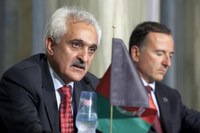 Minister Spanta made his remarks in the opening session of the 'Conference on Afghanistan and its geographical context: Development of a regional network of cultural and scientific cooperation," held on 26 June 2009 in Trieste, Italy, within the framework of the G8 Ministerial Meeting.' The conference was co-organized by the Italian Ministry of Foreign Affairs and TWAS.
Minister Spanta made his remarks in the opening session of the 'Conference on Afghanistan and its geographical context: Development of a regional network of cultural and scientific cooperation," held on 26 June 2009 in Trieste, Italy, within the framework of the G8 Ministerial Meeting.' The conference was co-organized by the Italian Ministry of Foreign Affairs and TWAS.
The Minister acknowledged that Afghanistan's recent woes, including two decades of violent conflict, have taken a heavy toll on the nation. Millions of Afghanis have fled their country for greater security and opportunities elsewhere. Among those who have left, he noted, were "a great many technocrats and professionals, including doctors, lawyers, engineers, teachers, scholars, artists and scientists." Such migration, he observed, has led to "a severe brain drain."
Afghanistan has sought to address its critical challenges by placing added emphasis on education. The goal, says Minister Spanta, is "to ensure a future generation of competent and professional leaders." To this end, more than 7 million young Afghanis are now enrolled in school. Twenty-nine universities, with a total of nearly 75,000 students, are also operating.
But Afghanistan's future, Minister Spanta readily acknowledged, will also depend on assistance and collaboration from others. That is why he expressed praise for the conference, which he observed brought together a distinguished group of scholars, academics and scientists. This event, he said, offered "a unique opportunity to exchange views on common challenges." He noted that "for the sake of prosperity in the region, we must make the best use of this opportunity."
The 'Conference on Afghanistan and its geographic context: Development of a Regional Network of Cultural and Scientific Cooperation' was attended by more than 100 members. It included presidents and representatives of the Afghan, Chinese, Egyptian, Indian, Iranian, Italian, Pakistani, Russian and Turkish academies of sciences and heads of scientific centres. The directors of Trieste's scientific centres also made presentations.
In addition to Minister Spanta, the opening session of the conference featured speeches by Franco Frattini, Minister of Foreign Affairs, Italy and Hon. Makhdoom Shah Mahmood Qureshi, Minister of Foreign Affairs, Pakistan.

